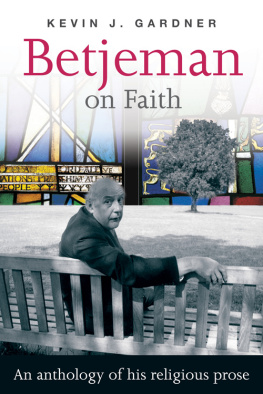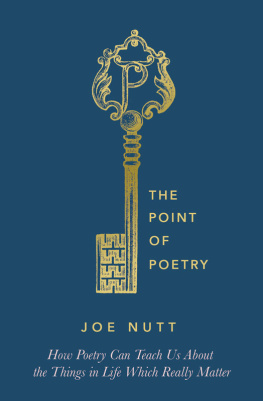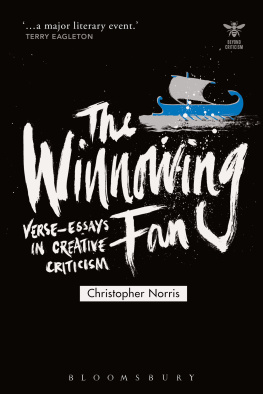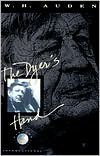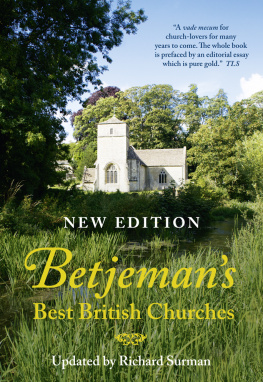I simply skimmed across frontiers
Max Beerbohm

Discover books by Richard Church published by Bloomsbury Reader at
www.bloomsbury.com/RichardChurch
A Stroll before Dark
Over the Bridge
The Dangerous Years
The Voyage Home
Share your reviews and comments with us via .
Richard Church was born in London in 1893. At the age of sixteen, persuaded by his father, he took a position as a clerk in the Civil Service where he worked for the next twenty-four years. During that time he worked tirelessly on his love of all things literary, devoting early mornings, between 5 and 7, and most of his evenings to writing and reading. In 1917 this hard regime was rewarded and his first volume of poetry, The Flood of Life, and Other Poems, was published. But real success and acclaim came only in 1926 with the publication of Portrait of the Abbot.
In 1930 Richard gave up his position with the Civil Service and began a full-time writing career. He died in 1972, with over sixty books of poetry and prose to his name, having firmly established his position in English literary heritage.
A Stroll Before Dark
Essays
Richard Church

For copyright reasons, any images not belonging to the original author have been removed from this book. The text has not been changed, and may still contain references to missing images.
This electronic edition published in 2015 by Bloomsbury Reader
Bloomsbury Reader is a division of Bloomsbury Publishing Plc, 50 Bedford Square, London WC1B 3DP
First published in Great Britain in 1965 William Heinemann Ltd
Copyright 1965 Richard Church
All rights reserved
You may not copy, distribute, transmit, reproduce or otherwisemake available this publication (or any part of it) in any form, or by any means(including without limitation electronic, digital, optical, mechanical, photocopying, printing, recording or otherwise), without the prior written permission of thepublisher. Any person who does any unauthorised act in relation to this publicationmay be liable to criminal prosecution and civil claims for damages.
The moral right of the author is asserted.
eISBN: 9781448214884
Visit www.bloomsburyreader.com to find out more about our authors and their books. You will find extracts, author interviews, author events and you can sign up for newsletters to be the first to hear about our latest releases and special offers.
You can also find us on Twitter @bloomsreader.
Contents
Part One
Moving About
Part Two
Sitting Still
Chapter 1
The Weeping Willow Tree
Twenty-five years ago I made a garden here, out of the tag-end of a cherry orchard that crowns a Kentish hill-top, and a corner of the field below it. The ground sloped southward, so much had to be done before planting began. Three terraces of ground, two to be grassed, and the lowest, hidden by young yew bushes (which have since become a thick square hedge), to be a vegetable garden. On the top terrace before the house I made a small fishpond by sinking a huge iron tank taken from the roof of the laundry of the neighbouring school. I exchanged it for a six-bar gate and the promise to give an occasional talk to the boys.
Beside the iron-clad pond I laid York paving-stones, debris of the bombed London pavements (but that was a year later). Then I bought for a shilling a thin sapling, a weeping willow, and set it to overhang the pond. I imagined that this would be a long-term policy, but within four years that willow was already doing its picturesque job. Indeed, it threatened to dominate the whole garden. We did not object, for it was a graceful youngster. Its fronds of pale green, with tiny yellow catkins, flung themselves out in the spring, and in the winter they hardened into coral-tinted streamers that whipped in the wind, and threaded themselves with snow, or glistened in the rain like copper wire.
Year by year I watched the trunk expanding. Small cracks in the bark quickly filled up, hardly giving time for tree-creepers and tits to suck the sweet moisture that was to solidify and cement the bark into a seamless coat. The willow commanded attention because it was full of temperament. The rest of the vegetation which we plantedthe yew hedges, the red plum, the crab-apple, and the utility fruit trees all flourished, but in a sober and unobtrusive way. They may have been self-centred, but they did not advertise the fact.
The weeping willow, however, became a prima donna. She went in for colour schemes, as I have shown. She took to dancing. Her measures were patterned according to the tunes played by the orchestra of the winds. When a harsh northeaster came snuffling over the hill, she flung a tragic pose, leaning over the pond and throwing out her fronds with all the despair of a Hecuba. But she continued to grow lustily (a habit of prima donnas). In the summer, when a hot day was caressed suddenly at noon by a sighing lift from the south-west, she trembled within her delicate green robe, so that it shook out a few faded leaves and sometimes a tiny cloud of pollen, almost angering my neighbours bees who were mumbling there. The surface of the pond was dusty and mottled with the discarded vegetable matter, and the golden carp came up to gasp at it, opening their mouths like miniature vacuum cleaners and sucking in the ichor.
The willows visible music must have appealed to the birds also. A green woodpecker made his headquarters there, and could be heard croaking his derisive laughter from spring to autumn. I willingly put up with that satire, because he made so harmonious a colour scheme; his exotic, tropical cap and throat shone vividly in that cool green setting. The blue-tits too, hanging upside down as they milked the catkins, added their gaiety to the willows Liberty garment. One hot June night I was wakened by the throbbing song of a nightingale, more daring than most of her kind, who was hidden somewhere in those cool branches. I got up and peered out on the garden. There was no moon, but the sky was so clear that the starlight filled the whole dome with a dusty radiance, making the outline of the willow visible; a ghost-shape of no distinct colour, but suggestive of other-world tints, strange metals and unearthly elements. Out of this cold shape came that burning, pulsing music, troubled yet ecstatic. I registered my impression more prosily than did Keats of that same song a century and a half ago in the mulberry tree in the front garden of the villa in Wentworth Place in Hampstead.
Many a quiet tea-party, of two, or sometimes with a few friends, year after year, has been enjoyed beneath that ever-growing panache of green. I can think of books read in that shade, and of conversations whose echoes linger in my mind, the ideas precipitated by them settled permanently with a touch of green thought, an experience I share with Andrew Marvell. Time has nothing to do with these adventures of the mind hand in hand with the five senses, blessed by the recording Mystery whom we hardly dare to name.
Season after season have gone over my garden, with a recurring likeness that is never quite the same. During the Battle of Britain, and again when the V1 bombs were roaring over Kent from France on their way to London, fragments of steel lodged in my trees and were sunk in my lawns. One such carved demoniac initials down the trunk of the willow. The scar closed quickly, but the signature remained there for years. Then in 1952, the newly arrived blue-grey kitten, Musetta, driven by
Next page

